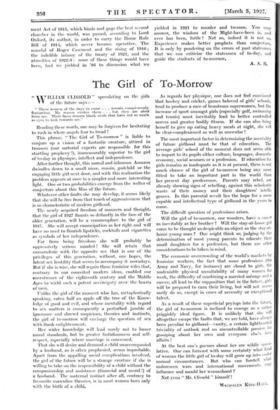The Girl of To-Morrow
" WILLIAM CLISSOLD " speculating on the girls of the future says :- " These women of the days to come . . . remain conspicuously featureless. My reason evokes them . . . but they are aloof from me. Their faces remain blank ovals that have not so much as eyes to look towards me."
Reading these words, one may be forgiven for hesitating to rush in where angels fear to tread !
This phrase, " The Girl of To-morrow " is liable to conjure up a vision of a fantastic creature, attired in trousers (our sartorial experts are responsible for this startling prophecy !), immeasurably superior to the girl of to-day in physique, intellect and independence.
After further thought, this unreal and inhuman Amazon dwindles down to a small niece, cousin, godchild or the engaging little girl next door, and with this realization the problem appears at once in a simpler and more interesting light. One or two probabilities emerge from the welter of conjecture about this Miss of the future.
Whatever other faults she may develop, it seems likely that she will be free from that touch of aggressiveness that is so characteristic of modern girlhood.
The newly acquired freedom of manners and thought, that the girl of 1927 flaunts so defiantly in the face of the older generation, will be a commonplace to the girl of 1947. Shc will accept emancipation as her right and will have no need to flourish lipsticks, cocktails and cigarettes as symbols of her independence.
Far from being frivolous she will probably be oppressively serious minded ! She will retain that camaraderie with the opposite sex that is one of the privileges of this generation, without, one hopes, the latent sex hostility that seems to accompany it nowadays. But if she is wise, she will regain those feminine wiles that, contrary to our conceited modern ideas, enabled our ancestresses of the eighteenth century and the Middle Ages to wield such a potent sovereignty over the hearts of men.
Unlike the girl of the moment who has, metaphorically speaking, eaten half an apple off the tree of the Know- ledge of good and evil, and whose mentality with regard to sex matters is consequently a perturbed jumble of ignorance and shrewd suspicions, • theories and instincts, the girl of to-morrow will envisage the question of sex with frank enlightenment.
Her wider knowledge will lead surely not to looser moral standards, but to greater fastidiousness and self- respect, especially where marriage is concerned.
That she will desire and demand a child unaccompanied by a husband, as is often prophesied, seems improbable.
Apart from the appalling social complications involved, the girl of the future will be a strange creature if she is willing to take on the responsibility of a child without the companionship and assistance (financial and moral !) of a husband.. The maternal instinct after all, contrary to favourite masculine theories, is in most women born only with the birth of a child. As regards her physique, one does- not feel convinced that hockey and cricket, games beloved of girls' schools, tend to produce a race of beauteous superwomen, but the increase of sport amongst girls (especially golf, swimming and tennis) must inevitably lead to better controlled nerves and greater bodily fitness. If she can also bring herself to give up eating heavy meals at night, she will be clear-complexioned as well as muscular !
The most important factor in determining the mentality of future girlhood must be that of education. The average girls' school of the moment does not seem able to impart to its pupils either culture, languages, domestic economy, social acumen or a profession. If education for girls remains as inadequate as it is at present, there is not much chance of the girl of to-morrow being any more fitted to take an important part in the world than her present day predecessor. Parents may rebel, are already showing signs of rebelling, against this scholastic waste of their money and their daughters' genres. In this parental revolt lies the hope for a more capable and intellectual type of girlhood in the years to come.
The difficult question of professions arises.
Will the girl of to-morrow, one wonders, have a career as inevitably as her brother ? Will the stay-at-home girl come to be thought as despicable an object as the stay-at- home young man ? One might think so, judging by the determination of most young parents to educate their small daughters for a profession, but there are other considerations to be taken in mind.
The economic overcrowding of the world's markets by feminine workers, the fact that some professions (the Army and Navy, for instance) are closed to girls, the undeniable physical unsuitability of many women for work, the difficulty of combining a married menage and a career, all lead to the supposition that in the future, girll will be prepared to earn their living, but will not neces- sarily- do so, except in cases of necessity or exceptional talent.
As a result of these superficial pryings into the future, the girl of to-morrow is inclined to emerge as a rather priggishly ideal figure. It is unlikely that she will altogether escape the faults that, we are told, have alwayi been peculiar to girlhood—vanity, a certain lighthearted triviality of outlook and an uncontrollable passion for gossiping about her own and everyone else's love affairs !
At the best one's guesses about her are wildly specu- lative. One can forecast with some certainty what kind of woman the little girl of to-day will grow up into under normal circumstances. But who can foretell what unforeseen wars and international movements ma) influence and mould her womanhood ?
• Not even " Mr. Clissold " himself !
MikaDALEN KING-HALL.






























































 Previous page
Previous page